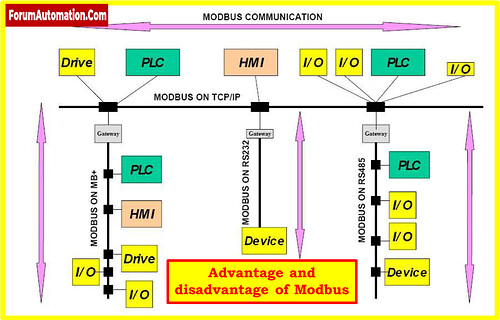Advantages of Modbus
Implementation Ease and Simplicity
- Modbus is famous for its simple configuration.
- Because of its ease of use, engineers and developers of all skill levels can use it, which facilitates speedy integration into industrial systems.
Interoperability
- Because Modbus is a vendor-agnostic protocol, equipment from various manufacturers can interact with each other without difficulty as long as they follow the Modbus standard.
- This compatibility encourages the flexibility of system design and equipment selection.
Wide Applications
- The industrial automation environment is heavily reliant on Modbus, which has been in use for many years.
- Due to this widespread usage, there is a sizable user base, a wealth of documentation, and a wealth of resources for help and troubleshooting.
Flexibility in Communication Mediums
- Modbus provides a variety of communication channels, including Ethernet-based (Modbus TCP) and serial (Modbus RTU) communication.
- This adaptability enables engineers to select the best media for their particular application.
Effective for Low-Bandwidth Networks
- Modbus RTU is effective for low-bandwidth networks due to its binary encoding.
- Applications where data transfer speed is not essential can use it.
Disadvantages of Modbus
- Modbus has long provided simplicity, interoperability, and reliability as a core protocol for industrial communication.
- However, in the context of contemporary industrial systems, their inadequacies, particularly in terms of security and data processing, have become more obvious.
- Newer communication protocols are increasingly being adopted as industries develop in order to meet these restrictions as well as the requirements of high-speed data transport, security, and sophisticated data structures.
Limited Security Features
- Modbus has a limited number of security features, rendering it vulnerable to hacker assaults and illegal access.
- Security is a top concern in today’s networked world, and using Modbus without additional security measures might carry significant risks.
Limited Data Types:
- Modbus only supports a small number of data types, which might be problematic when working with complex data structures or cutting-edge applications.
Slow Data Transfer Rates
- Modbus, particularly the RTU version, can have slower data transfer rates than more recent protocols.
- When working with applications that demand rapid connectivity or real-time data updates, this limitation may be a problem.
Lack of Error Checking
- Error checking is lacking in Modbus, despite the fact that it does incorporate several fundamental safeguards, making it less reliable than some other protocols.
- If this isn’t handled correctly, it could cause problems with data integrity.
Not Suitable for Large Networks
- Modbus may not be the ideal option for large networks with many devices because of its addressing restrictions and potential communication bottlenecks.
Lack of Built-in Redundancy
- The Modbus protocol does not have any built-in redundancy mechanisms; hence, it is not very reliable.
- Additional rules and precautions must be put in place for important systems where redundancy is crucial for high availability.
